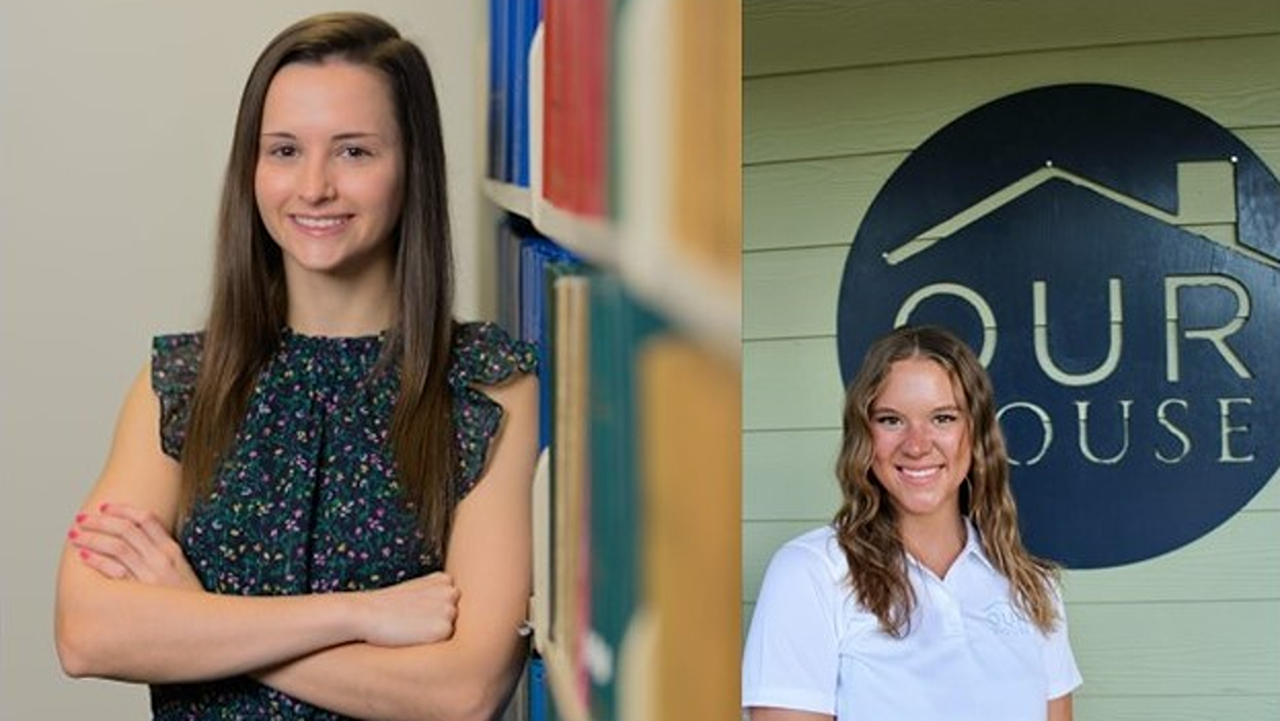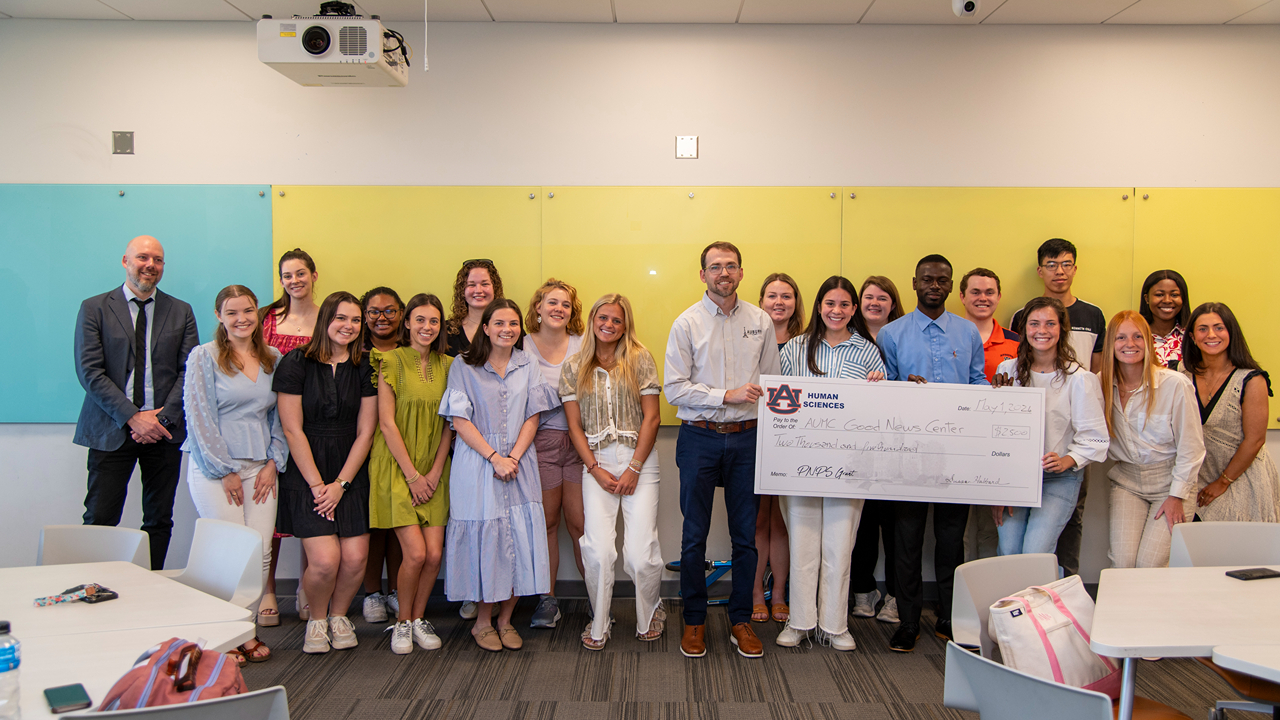content body
Since its inception in the 2019 fall semester, students in the College of Human Sciences have been able to enroll in a major that focuses on solving critical problems, and in turn helping people and organizations. These students are learning all aspects of the nonprofit sector and philanthropic endeavors by pursing and obtaining a Bachelor of Science in philanthropy and nonprofit studies (PNPS).
Fast forward a few years, and a pair of alumnae among the first crop of PNPS graduates took the time to reflect on their hours spent learning comprehensive knowledge through a variety of classes, gaining real-world insight and hands-on experience through internships and more in a major that has seen steady, continued growth since its addition as an undergraduate degree program in the College of Human Sciences Department of Consumer and Design Sciences.
“I was attracted to the PNPS program because I knew that I wanted to help people, but I didn't know how to go about it.”
Gabby Thabes, an alumna who earned her Bachelor of Science in philanthropy and nonprofit studies in the spring of 2023, said she chose the PNPS path because she knew she wanted to help people. Associate Professor and Philanthropy and Nonprofits Studies Program Coordinator Dr. Peter Weber helped serve as a mentor to Thabes along the way.
“I was attracted to the PNPS program because I knew that I wanted to help people, but I didn't know how to go about it,” Thabes said. “I liked the idea of solving real world problems by applying business-like concepts and critical thinking, but I also appreciated the idiosyncrasies of the nonprofit sector. Even though some for-profit concepts parallel, the nonprofit industry is so unique and must adhere to so many different regulations–i.e. tax differences, donor stipulations, fundraising vs. selling products, etc. I felt like it would challenge me intellectually while also producing a benefit for society and allowing me to pursue the causes about which I'm passionate. Dr. Weber influenced me heavily in the PNPS program. He was an excellent mentor and faculty advisor. He truly cares about his students and is always looking for creative ways to engage them and ensure that their curriculum is actually relevant and applicable to their future career. He also was a huge help in serving as a recommender for my job applications.”
Reagan Myers, an alumna who double majored and earned her Bachelor of Science in philanthropy and nonprofit studies and human development and family science in fall 2023, spoke about how her experiences in the classroom, specifically the Grantmaking for Philanthropists course, prepared her for her career following graduation.
“There are so many opportunities in classes to work with professionals in the community and many of our classes brought in professionals to speak to us and we actually got to work with them in different capacities,” Myers said. “I learned how to have professional disagreements with people and how to have professional debates. I'll always be working with people who have different perspectives and life experiences than me. In our grantmaking course, as a class we had to go through the request for proposal process, and I believe my semester we had 18 applicants that applied for our grant. As an entire class of 20 or so students, we had to all decide to give our money to one of those organizations, and we all had different passions and life experiences that made us want to give the money to an organization that we personally wanted. But we had to look at it objectively and pick one organization to give our grant to, so that taught me a lot about working with people and having professional disagreements.”
For Thabes, she echoed Myers sentiments and claimed the Grantmaking for Philanthropists course was invaluable.
“One of the most rewarding things about this major was the grantmaking class I took,” Thabes said. Dr. Weber teaches it, and he provides students with a hands-on opportunity to write and send out a request for proposal, review submitted proposals, tour and speak with nonprofit professionals, deliberate the process, and then actually award a grant to a local organization serving Lee County. It was one of the most invaluable experiences I had in college and has already helped me so much in my career.”
Weber spoke to the growth of the PNPS program and looks forward to seeing graduates excel in the future.
“The PNPS program has steadily grown over the past five years despite the disruption caused by the COVID pandemic,” Weber said. “The first time we offered the grantmaking course in the spring of 2021, only six students were enrolled in the course, while we had around 20 students in the course the last two times we’ve offered it. This is remarkable and speaks to the passion and commitment of our students and graduates to improve the quality of life of our communities, both nationally and internationally. Gabby and Reagan, like all our graduates, are passionate, young professionals that started making a difference in their communities even before graduating. I’m excited to see what they will accomplish in the years to come.”
Following graduation, Thabes now serves as the donor & volunteer relations manager for a nonprofit called United Ability in Birmingham.
“For those thinking of majoring in PNPS, take as many opportunities to network and get that hands-on experience as much as you can."
“We provide services to more than 6,000 individuals with disabilities and their families each year and have programs spanning every stage of life,” Thabes said. “I love what I do and plan to continue pursuing a career focused on empowering people with disabilities to thrive. I'm definitely learning new things every day and am so thankful to be growing my skill set at United Ability. I hope to one day reach an executive position here or at a similar nonprofit.”
For Myers, her career was jumpstarted thanks to a volunteer opportunity with Our House, a nonprofit that serves families who live in the Auburn Housing Authority, that then turned into a full-time job opportunity where she now serves as the volunteer and K-7th grade program coordinator.
“I manage our kindergarten through seventh grade programs, and we’ve got about 68 weekly volunteers starting the school year that I oversee and do all the coordinating for them,” Myers said.
For Thabes and Myers, getting a great start out of college is in large part due to the comprehensive curriculum in the PNPS program that prepared them for success.
“For those thinking of majoring in PNPS, take as many opportunities to network and get that hands-on experience as much as you can,” Myers said. “Because you never know what could lead to a future job or you don't know who people know. Whether you end up doing 20 service-learning hours and then end up working for that organization or have a conversation with one of the guest speakers in your classes. Then it turns out that they know the person that works there that hires people for the organization. You want to take those opportunities to talk to people and get to know the professionals in the field.”
For more information on the philanthropy and nonprofit studies undergraduate degree program, click below.
College of Human Sciences PNPS Program





